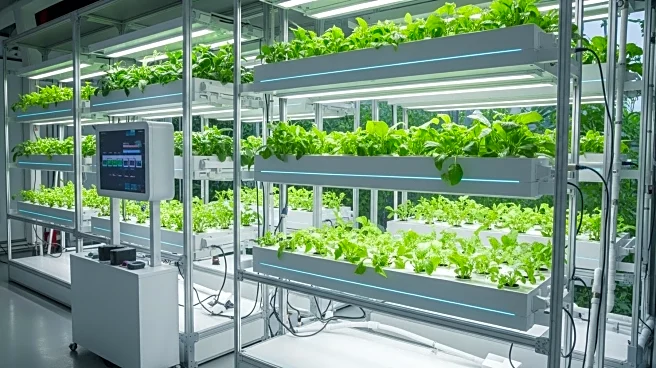What's Happening?
The global aeroponics farming market is experiencing rapid growth as sustainable agricultural practices gain traction. Aeroponics, a method of growing plants in a nutrient-rich mist environment without soil, is being adopted as a solution to address food security, climate change, and water scarcity. This technique offers higher yields, faster growth cycles, and eco-friendly cultivation methods, using up to 90% less water and eliminating the need for pesticides. The market is driven by increasing urbanization, government support for sustainable farming, and technological advancements such as IoT-enabled smart farming solutions.
Why It's Important?
Aeroponics farming represents a significant shift towards sustainable agriculture, addressing critical issues such as water scarcity and the demand for organic food. As the global population approaches 10 billion by 2050, sustainable farming solutions like aeroponics are essential to meet rising food demands. The technique's efficiency in water use and its suitability for urban and vertical farming make it a promising option for regions with limited agricultural land. The growth of the aeroponics market could lead to reduced dependency on traditional farming methods and imported crops, enhancing food security.
What's Next?
The aeroponics farming market is expected to continue expanding, with North America currently leading due to advanced agri-tech infrastructure. Asia-Pacific is projected to witness the fastest growth, driven by increasing food demand in countries like India and China. The industry faces challenges such as high initial investment costs and the need for skilled labor, but ongoing research and technological advancements are likely to overcome these barriers. Future opportunities include automation, renewable energy-powered farms, and AI-driven crop monitoring, which could enhance scalability and efficiency.
Beyond the Headlines
Aeroponics farming could play a crucial role in transforming the agricultural landscape, promoting sustainability and reducing environmental impact. The integration of technology in farming practices may lead to ethical considerations regarding data privacy and the role of human labor in agriculture. As the industry grows, it may also influence cultural perceptions of food production and consumption, encouraging a shift towards locally sourced and pesticide-free produce.









